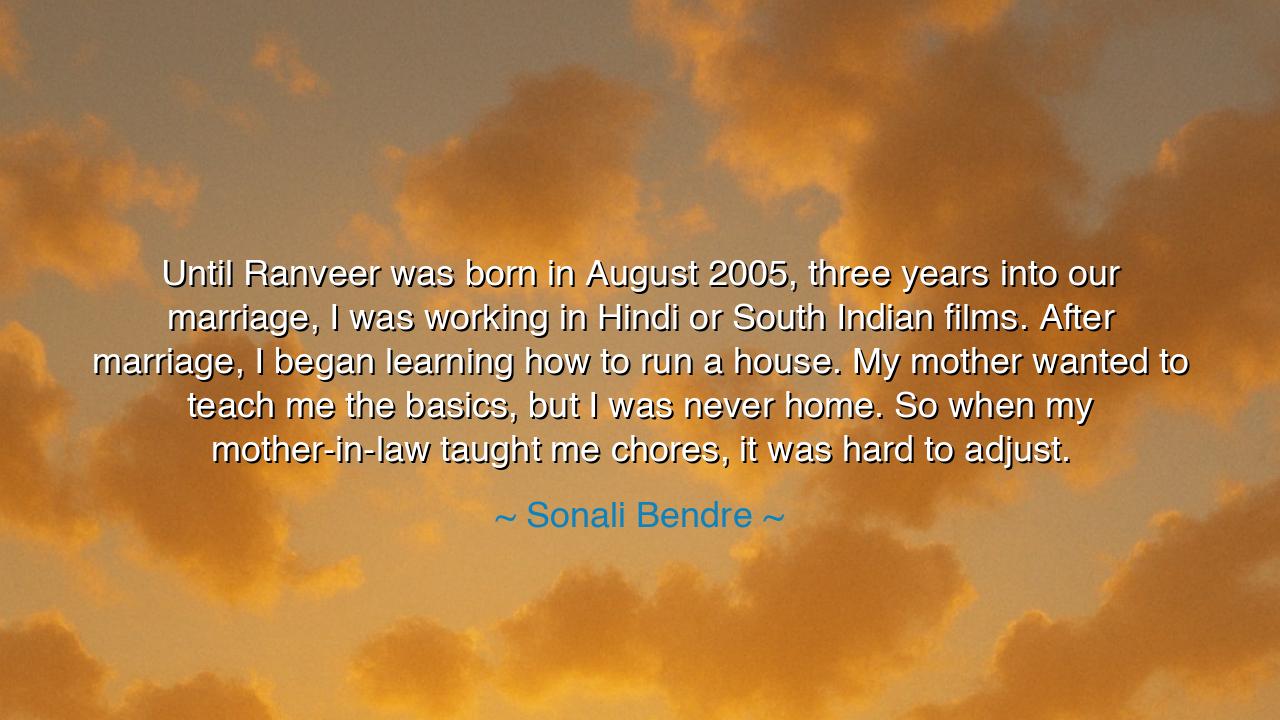
Until Ranveer was born in August 2005, three years into our
Until Ranveer was born in August 2005, three years into our marriage, I was working in Hindi or South Indian films. After marriage, I began learning how to run a house. My mother wanted to teach me the basics, but I was never home. So when my mother-in-law taught me chores, it was hard to adjust.






In a voice both tender and timeless, Sonali Bendre spoke of her transformation, saying, “Until Ranveer was born in August 2005, three years into our marriage, I was working in Hindi or South Indian films. After marriage, I began learning how to run a house. My mother wanted to teach me the basics, but I was never home. So when my mother-in-law taught me chores, it was hard to adjust.” At first glance, her words seem simple—a reflection on domestic life and the shift from career to home. But beneath them lies a universal truth: the journey from independence to interdependence, from the outer world to the inner hearth, is one of the most profound transformations in a woman’s life. Hers is not merely the tale of an actress—it is the story of countless souls learning to balance duty, identity, and love in the great theatre of existence.
The origin of the quote rests in Bendre’s own life—a celebrated actress who graced the screens of Hindi and South Indian cinema, admired for her beauty and grace. Yet, after marriage and the birth of her son, she faced a new script, one not written by directors or studios, but by destiny itself. No camera lights shone on this stage; instead, there was the quiet rhythm of domesticity—the learning of chores, the adjustment to family life, the humbling process of beginning anew. What she describes with humility is in truth a rite of passage, one as ancient as civilization itself: the transformation of a woman from individual achievement to shared responsibility, from the freedom of youth to the rootedness of home.
To “learn how to run a house” is not merely to clean or cook—it is to understand the invisible architecture of love that sustains family life. It is to discover patience, humility, and rhythm in the mundane. For the ancients taught that mastery of the self begins not in palaces or academies, but in the home. The house is the first kingdom, and he or she who rules it with care learns the art of harmony. Yet, as Sonali admits, it was “hard to adjust.” This confession is sacred, for it reveals that even those who seem to have conquered the outer world must still wrestle with the lessons of the inner one. The struggle between habit and humility, between independence and belonging, is the crucible through which true wisdom is born.
There is a story from long ago of Queen Ahalya Bai Holkar, who, after her husband’s death, ruled a kingdom with justice and compassion. Yet before she became queen, she was known for her quiet devotion at home—serving elders, learning household discipline, and cultivating patience. Those early lessons became the foundation of her greatness as a ruler. So too, Sonali’s experience teaches us that even the most public of lives must be anchored in private virtue. Without understanding the small acts that bind human hearts—care, service, patience—no empire, no career, no dream can endure.
The mother and the mother-in-law in Sonali’s words symbolize two traditions of womanhood—the one that nurtures from birth, and the one that receives through marriage. To learn from both is to bridge generations. Yet in modern times, where success is often measured by titles and fame, the art of domestic grace is sometimes dismissed as lesser. Bendre’s humility reminds us that there is dignity in learning, even from the simplest tasks. To serve one’s family, to manage a home, to honor the wisdom of elders—these are not regressions, but acts of grounding. They remind us that a life without balance, however glittering, is incomplete.
Her words also echo the truth of adaptation and growth. Change is never easy, especially when it calls us to begin again in unfamiliar roles. But the spirit that learns is the spirit that lives. Sonali’s story becomes a parable for all who struggle with transition—those moving from youth to maturity, from career to family, from ambition to contentment. Each stage of life demands surrender, and in surrender there is not loss, but renewal. For the one who accepts change with grace becomes larger, deeper, and wiser.
Let this teaching be taken to heart: whether man or woman, never scorn the tasks that humble you, for they are the teachers of patience and empathy. Greatness is not only in achievement, but in adjustment. Every season of life holds its own lessons; to resist them is to stagnate, but to embrace them is to evolve. Sonali’s journey—from film star to homemaker, from independence to shared duty—is a reminder that life’s truest education often begins when the applause has ended and the quiet work begins.
Thus, the wisdom stands: to live fully is to learn endlessly, even when the lessons come disguised as chores, as discomfort, or as change. Honor every role life grants you, for each—whether on stage or at home—is a chapter in the soul’s growth. As Sonali Bendre’s life reveals, the heart that learns to serve with love will one day understand the deepest art of all: the art of living well.






AAdministratorAdministrator
Welcome, honored guests. Please leave a comment, we will respond soon